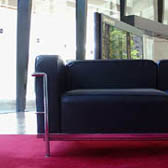-
 pourquoi me consulter ?
pourquoi me consulter ?Apprenez-en plus au sujet de mon parcours professionnel.
en savoir plus -
 thérapie court et moyen terme
thérapie court et moyen termeComment se déroule une thérapie dans mon bureau.
en savoir plus -

bienvenue
-
Geneviève Despatie, M.A. Sexologue psychothérapeute
-
Vous trouverez sur mon site des renseignements pertinents sur le déroulement d'une thérapie, mes approches thérapeutiques en psychothérapie et sexothérapie, sur la thérapie de couple, la thérapie individuelle, sur mes spécialisations et plus encore…
Je priorise les rencontres en personne si vous ne présentez pas de symptômes grippaux. Si vous présentez des symptômes grippaux ou si vous êtes en isolement volontaire, je vous offre d'effectuer des rencontres téléphoniques ou virtuelles à distance.
-
Entreprendre une thérapie est une décision sérieuse et votre démarche mérite qu'une personne de confiance vous guide. Soyez assuré du professionnalisme, du respect et de la confidentialité avec lesquels je vais traiter votre démarche.
Je suis membre de l'Ordre Professionnel des Sexologues du Québec (OPSQ) et détentrice du permis de psychothérapeute émis par l'Ordre des Psychologues du Québec (OPQ) qui sont des organismes de surveillance assurant la protection du public.
Je suis consciente que de discuter de problèmes personnels, relationnels ou sexuels avec une personne inconnue peut en rebuter plus d'un. C'est pourquoi j'ai décidé de produire un site à mon image, soit très authentique qui vous permet d'en apprendre davantage sur ma pratique professionnelle et mon expérience clinique. -
Une sexologue psychothérapeute à Boucherville sur la Rive-Sud de Montréal
Mon bureau est situé à Boucherville sur la rive-sud de Montréal. Je vous invite à consulter mes coordonnées pour en savoir davantage et vous renseigner sur les trajets les plus simples si vous provenez de la Montérégie ou de Montréal.
Je vous propose de consulter la section « Pour en savoir plus sur ma pratique… » qui démystifiera certainement ce qu'implique un processus thérapeutique avec moi. Je vous invite aussi à consulter mes différentes spécialisations.
Sexologue et psychothérapeute depuis plus de 20 ans, j'ai été formée à l'Université du Québec à Montréal. Je suis titulaire d'une maîtrise en sexologie clinique. Ma participation régulière à de la formation continue vous assure une expertise et une thérapie de couple ou individuelle adaptée aux plus récentes avancées en matière de sexologie et de psychothérapie.
Je vous invite à me contacter si vous avez des questions ou si vous souhaitez prendre un rendez-vous prochainement.
Au plaisir de vous rencontrer !
Geneviève Despatie, M.A. Sexologue et psychothérapeute
spécialisations
Adresse de mon bureau
(sur rendez-vous seulement)
Cabinet privé
100 Boul. de Montarville # 208
Boucherville, Qc, J4B 5M4
Téléphone:514.378.7188
info@sexologuepsy.com
Ancien cabinet - maintenant fermé -
1030 rue Cherrier bureau 314
Montréal, Qc, H2L 1H9
Téléphone:514.378.7188
info@sexologuepsy.comcarte et itinéraires
permis de pratique
Sexologue
Cliquez ici pour consulter ma fiche professionnelle sur le site de l'OPSQ.
Psychothérapeute
Émis par l'Ordre des Psychologues du Québec (OPQ).
Cliquez ici pour consulter ma fiche professionnelle sur le site de l'OPQ.





